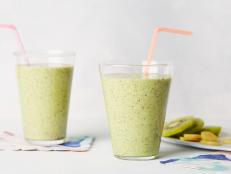Which Is Better: Smoothies or Juices?
Both are made of fruits and vegetables, but they're not created equal.

Westend61
As a registered dietitian and author of both a smoothie and juicing cookbook, I have blended, pressed, slurped and analyzed the nutrition numbers on many a fruit and veggie beverage. If sipping on smoothies or juices is part of your healthy lifestyle, you may be wondering: Which is better for you?
Similarities and Differences
Juices are made from extracting the liquid portion from plant-based foods, most typically fruits, vegetables and herbs. Juicers come in all shapes and sizes, some press the ingredients and others use more of a centrifuge-style machine that will grind and spin to remove the juice.
Smoothies can be (but are not always) a bit more complicated, made from blending fresh or frozen produce with some form of liquid and often additional ingredients, including yogurt, cottage cheese or protein powder.
Smoothies and juices both lend themselves to additional add-ins that can be included before or after blending or juicing. Brewed teas, spices, nuts, grains, seeds (such as flax or chia) are some of the usual suspects. From a nutritional standpoint, juices and smoothies can offer up a wide range of vitamins and minerals, along with fluid to help keep you hydrated.
Which Is Better?
The most impressive differences between smoothies and juices are the potential for what you don’t get to consume. Juicing leaves a portion of the ingredients behind in the form of pulp that is captured by the juicer in a separate section. And while you can use the fibrous pulp in recipes for veggie burgers and muffins, it is not a part of the juice. A large percentage of the pulp is fiber — the coveted non-digestible substance that helps feed healthy gut bacteria and regulate digestion. Blending smoothie ingredients may assist in the physical breakdown of some of the fiber; nothing is discarded. Juices also fall short in the protein department, unless a protein-rich ingredient is added to the expressed juice.
Smoothies may seem like the better choice, but it can depend on how you choose to consume them. Because you can add more ingredients to a smoothie, they can turn into an excessive dose of calories if you aren’t mindful of what and how much you are adding to the blender.
Both smoothies and juices are hydrating, refreshing, nourishing and an enjoyable way eat more produce. On the contrary, neither should be used as a regular meal replacement, perhaps with the exception of an occasional smoothie.
Dana Angelo White, MS, RD, ATC, is a registered dietitian, certified athletic trainer and owner of Dana White Nutrition, Inc., which specializes in culinary and sports nutrition. She is the author of four cookbooks First Bites: Superfoods for Babies and Toddlers, The Healthy Air Fryer Cookbook, The Healthy Instant Pot Cookbook and Healthy Quick and Easy Smoothies.
*This article was written and/or reviewed by an independent registered dietitian nutritionist.
Related Links:

































